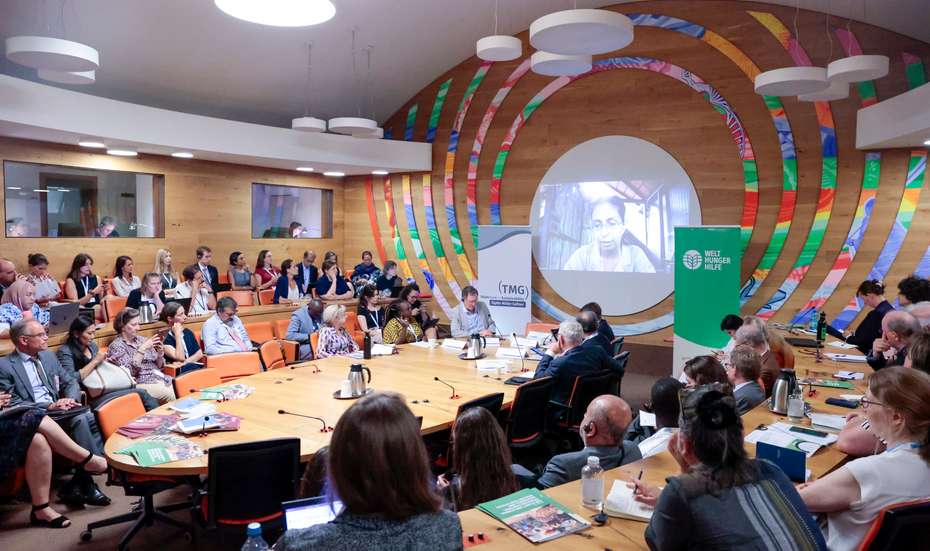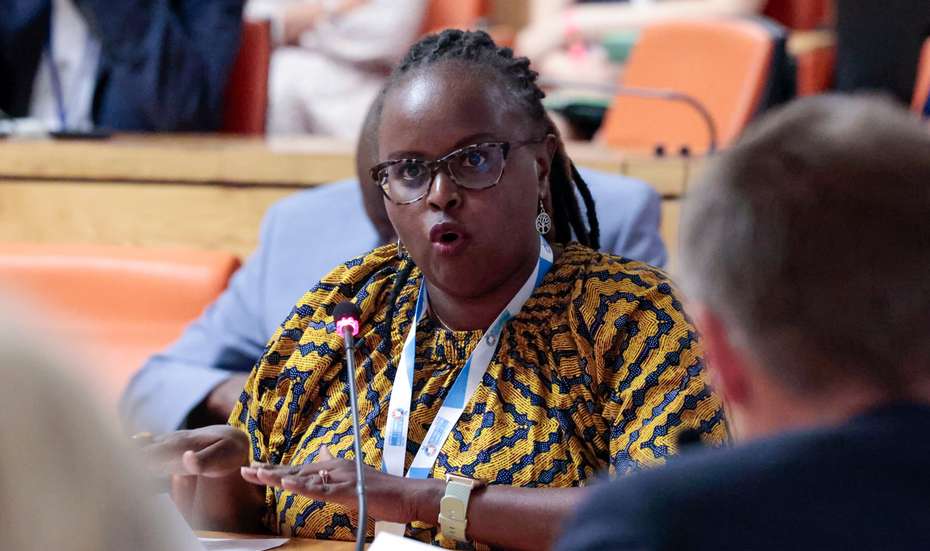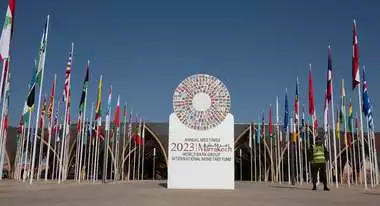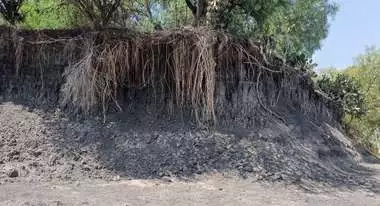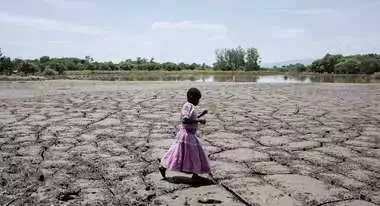“Local stakeholders play a crucial role in food systems governance”
Having a say in shaping food systems varies in difficulty for civil society organizations. Two activists from Africa and Asia talk about their experiences in this interview.
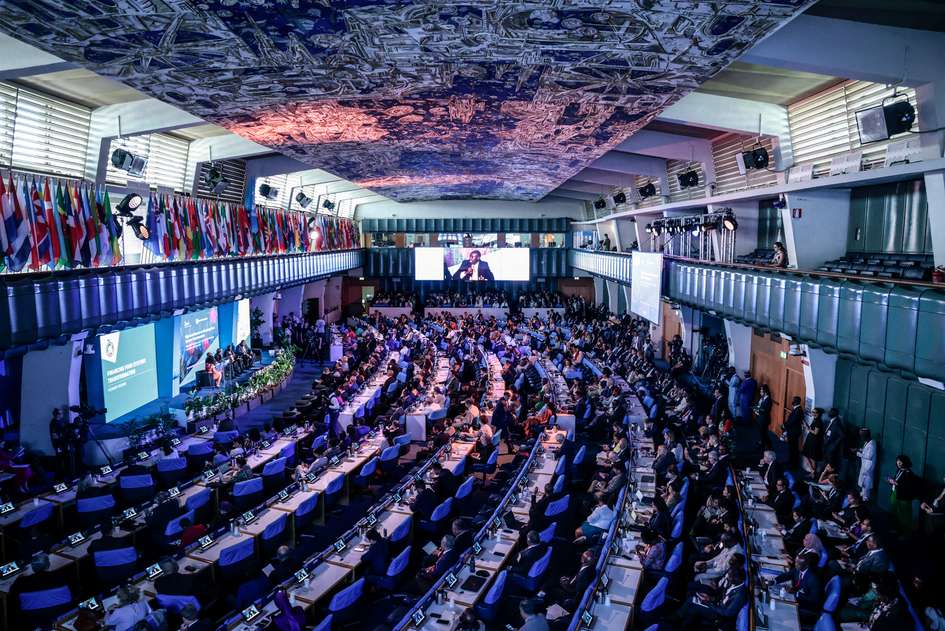
At the 2021 United Nations Food Systems Summit a multitude of stakeholders from all over the globe committed to the urgent need to transform our food systems as a crucial contribution to accelerating progress towards the SDGs. In July in Rome it was time to stake stock: At the United Nations Food System Summit +2 Stocktaking Moment (UNFSS STM) an estimated 2,000 delegates came together at the FAO Headquarters to assess the progress made in changing the course of how we produce, process, and consume food.
Marginalized groups such as indigenous people, smallholder farmers, women and youth are key actors in shaping our food systems – and their suboptimal inclusion in food system governance has been admitted even by the UN Secretary General who stated that “engagement with youth and Indigenous Peoples groups is still limited”. Also, German State Secretary for Development Cooperation Jochen Flasbarth acknowledged in a side event which focused on the inclusion of civil society and indigenous groups that „inclusive societies are the much stronger societies” and underlined that „the more involvement of local communities […] the better the solutions will be”.
To find out more, we talked to Mary Karanu from the Kenya Right to Food Coalition and Shamika Mone, President of INOFO, the Inter-continental Network of Organic Farmers Organisations, who participated in the side event.
About the persons:
African activist Mary Njeri Karanu heads the Kenyan organization Right to Food Coalition Kenya and is coordinator of Rural Outreach Africa (ROA), a multi-country initiative funded by the federal development budget. Shamika Mone, an Indian from Maharashtra, is chair of the Inter-continental Network of Organic Famers Organizations (INOFO). She first worked in academia, then turned to organic farming as an entrepreneur and farms nearly two hectares of rented land where she grows traditional rice varieties and vegetables.
Mary, you were in Rome for the UNFSS STM. What are your impressions of the summit? Did you see the necessary changes?
Mary Karanu Taking part in the UNFSS STM was a great experience. I was impressed with the call to a human rights approach by various presidents and prime ministers in their opening addresses. What I also observed is that most countries mentioned how we are dealing with the same kinds of challenges, especially the cost-of-living crisis and the debt crisis in Africa. I also observed that countries have contextualised food systems transformation and have taken priorities that make sense for them. For example, in Kenya, we prioritised youth engagement in food systems through agriculture clubs in schools, called 4K-clubs.
This highlights the crucial role of local stakeholders in food systems governance. We need to see more local governance because that is where the transformation is happening. At local level the interaction between the government and the people, people with nature, also the social interactions between people are simply closer. Thus, local governance is key.
“We need to see more local governance because that is where the transformation is happening.”
Mary KaranuShamika, INOFO [Inter-Continental Network of Organic Farmer Organisations] participated in the summit in 2021. Now you are not involved anymore. Why not? What needs to happen to bring you back on the table?
Shamika Mone In 2021, we as INOFO decided to host six independent dialogues, one on every continent. We also contributed to the pre-summit and the actual summit in 2021. INOFO is present in 72 countries, but when it comes to the national pathways, none of our members were involved, including our member in India. Later, a multi-stakeholder dialogue was organised to develop the Indian pathway. However, we were not part of it – and it was decided that India will focus on equitable livelihoods. Then nine priority key-areas to achieve equitable livelihoods were derived.
One key priority area was on bio-fortification and food fortification, which was vehemently pushed by the government without any piloting approaches. No precautionary measures were realized and now this approach is implemented in 15 Indian states. As a result, former independent communities are now increasingly dependent on fortified rice. But these people have their own traditional rice varieties, which contain micronutrients including iron. So, if efforts had been made to include farmers organisations, this knowledge of farmers would have been very helpful to boost local procurement, local production and also distribution within the locality so that people in the community have their own grown and iron-rich rice or at least rice which is locally produced.
Now, there is a threat to lose the independent lifestyle. In the past, we have seen that through systems that promote white polished rice many tribal communities suffer from - as we call it - “city lifestyle diseases”. This is an example that a lot of things need to be considered before a policy is implemented, and that it is very important to include the local Indigenous people and the marginal communities who are also mostly farmers.
To come back to your question: we were not involved this time as the past experience discouraged farmer groups to spend time and participate in such dialogues while they also have to manage their farm. Also, unless and until there is an inclusive governance system in place, whatever we speak at the global fora is unlikely to actually happen on the local or the national level. Therefore, regarding the UNFSS STM, we just contributed to the side event which was mainly organised by WHH and TMG.
“Unless and until there is an inclusive governance system in place, whatever we speak at the global fora is unlikely to actually happen on the local or the national level.”
Shamika MoneMary: You represent a civil society network, the Kenyan Right to Food Coalition, which actively engages in shaping food policies in Kenya. What are your experiences regarding inclusive governance processes? How important are they for food systems transformation in your country, and where do you see challenges?
Mary Karanu The Kenyan Right to Food Coalition is an inclusive alliance of 40 organisations dedicated to ensuring that every individual has access to adequate, nutritious, and culturally appropriate food. We advocate for legislation and policies. We support grassroots initiatives, and we foster collaboration among stakeholders. Two years ago, the Coalition organised independent dialogues at the subnational and national levels where we wanted to raise the issue of food as a human right. This underlined the importance of entitlements for rights holders and obligations and accountability of the state, but also of the private sector and civil society. We also look for opportunities where we can engage to influence policy and legislation. For example, in the run up to the 2022 general election in Kenya, the coalition developed a food manifesto and we lobbied political parties to address the issue of food in their political agenda. As a result, we saw a food subsidy being implemented. We also started to see politicians talking about food access in their campaign messages.
We, as civil society, bring in the grassroots perspectives which are likely to differ from priorities of the government. So, for example, food systems as an approach has not gained national or political prominence because we are still talking about food security. There is a narrow view about food. We are not seeing a holistic approach to solving the problem of hunger.
As a coalition, our advice is that government should lead food systems transformation, afterwards civil society, the private sector, research and the international community can come in to support. But most important is that the issues of the most vulnerable are addressed.
“Most important is that the issues of the most vulnerable are addressed.”
Mary KaranuShamika, you highlighted the challenges regarding access to and participation by farmers organisations in the policy process. Have you seen any progress in this regard in in Rome?
Shamika Mone It is very important to have farmers organisations included in the discussion at the policy table. We have seen it happening on the ground through efforts by the local organic farmers organisations here in Kerala. Just to give one example: In the last 40 years, many people left rice cultivation. There is an 80% reduction in paddy land cultivation in Kerala which now depends on rice imports from neighbouring states. We created awareness about the paddy land which not only produces the rice but also helps in many ecological services such as retaining the water inside the soil. With this improved awareness, a policy was developed by the government of Kerala called the “Paddy Land Wetland Act”. However, despite this Act, farmers did not necessarily start coming back to grow rice. It was only due to active participation of the local farmers who insisted on the importance of local rice varieties and the importance of paddy land. So this improved awareness led to a small subsidy given as support for those who are converting the fallow land back to paddy land for cultivation of traditional rice varieties. The point of this example is to showcase how local involvement of organic farmers helped to implement the policy on the ground. But on the other side, this also requires a lot of efforts from the farmers.
We as INOFO have 18 convenors who are globally connected, and each continent is represented by three convenors. But everything they are doing is completely on a voluntary basis. There is no paid staff working for INOFO. All other farmer organisations that are engaging in these global advocacy platforms are well established and have staff members to support advocacy and policy discussions. In sum, governance must be in place so that the global decisions get replicated on the ground. But at present we were not in Rome because we are short of capacity when it comes to doing farming ourselves, as well as engaging in advocacy on a voluntary basis.
So, I cannot talk about the progress. But I think that instead of doing Stocktaking Moments every two years which requires huge resources, more investment should go into building the necessary governance structures at the national level.
“Instead of doing Stocktaking Moments every two years which requires huge resources, more investment should go into building the necessary governance structures at the national level.”
Shamika Mone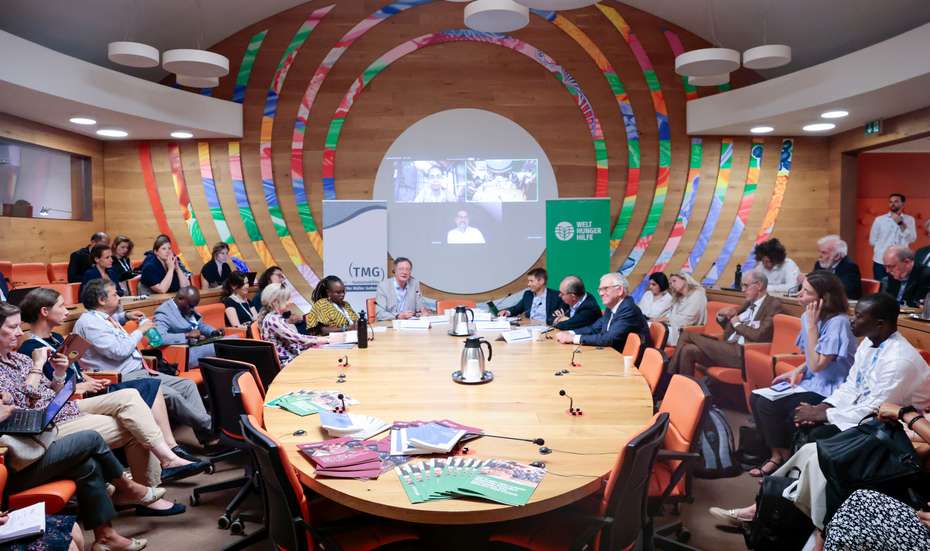
Mary, there has been also increasing criticism of such a massive conference from other parts of civil societies, some of them even boycotting the summit. Do you think that is the right decision?
Mary Karanu Even in the UNFSS STM the representative from the African Union talked about the Malabo commitment to dedicate 10% of our country's budgets to agriculture – 20 years on, it has not been realised. So, it makes us question what the use of these conferences is because countries take on new commitments while not having fulfilled what they committed to last time. But what I liked about the UNFSS STN is that we are not necessarily taking on new commitments. It is looking at the commitments that were taken over two years ago and seeing how effective they are. Are they addressing our real problems and do they need to be adjusted? For us as a coalition, we decided that we will engage and give prominence to the right to food in these kinds of conferences. By engaging in such events, we ensure that our interests and the interests of the vulnerable people we represent are included in the outcomes. So as a coalition, we collaborate whenever we can and confront when necessary – but we always engage!
What needs to happen next in Kenya? What is your plan as a civil society group and what do you expect from the government of Kenya?
Mary Karanu In Rome, I made important connections with people working in the food systems transformation space, and I also learned of new developments in the coordination of Kenyan food systems transformation – that the coordination has been moved from the Agriculture Transformation Office to the Cabinet Secretary's office. We are in conversation with them and we are going to follow up with our government and all other stakeholders who have been involved. Also, what we expect to see is that food systems transformation is happening by design. By that I mean holistic interventions that address all aspects of the food systems taking into consideration the needs and concerns of producers, consumers and the vulnerable. Also, we expect to see a more inclusive space for dialogue and collaboration. So far, processes around foods systems governance have been neither inclusive nor transparent. We need producers and consumers, we need national organisations, national and international NGOs, the private sector, research, all the relevant actors. In our conversation with the coordinating organisations responsible for the governance platform they have committed to remap the partners working in the food systems space in order to be more inclusive. Also, we expect to see the coordination of food systems transformation institutionalised because when governments or office bearers change, the focus and institutional memory can be lost. And above all: Different people will come with different priorities. If food systems transformation is institutionalised, then we know there is continuity and sustainability.
The interview was conducted by


